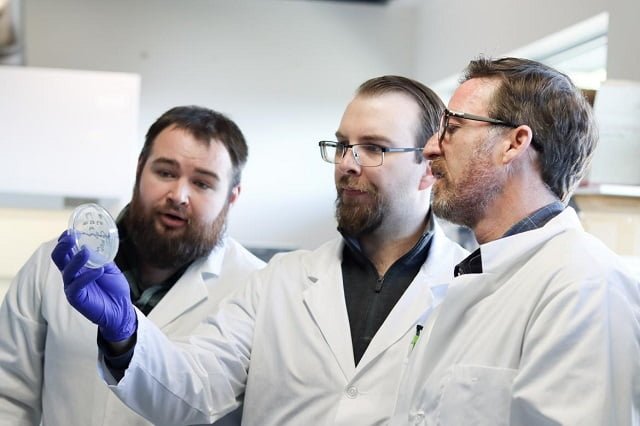
by Vancouver Island University
Dr. Spencer Russell is pursuing his research with the help of NSERC and Mitacs grants.
Russell, a Vancouver Island University (VIU) Fisheries and Aquaculture Associate Professor, is researching Tenacibaculum. These marine bacteria are responsible for a condition called mouth rot or yellow mouth in BC, which describes lesions found around the lower and upper jaws and gills of salmon. The genus of Tenacibaculum is comprised of many different species.
When salmon smolts move from freshwater to saltwater it’s a stressful event that can leave them vulnerable to infection by various species of Tenacibaculum, causing tenacibaculosis (mouth rot in salmon). Russell said Tenacibaculum is a naturally occurring bacteria found in the marine environment and is a problem in salmon production on the BC coast and around the world.
“If we sample ocean water, we can find it and research has shown we can find it occurring on jellyfish, sea stars and other marine animals. It’s out there,” said Russell. “We are trying to understand what changes occur when fish move from freshwater to saltwater that predisposes them to be infected by these marine bacteria.”
Russell’s research aims to help manage the disease caused by Tenacibaculum, improve fish welfare, mitigate the use of antibiotics in aquaculture and identify key species for future vaccine development.
There is an increasing amount of information circulating about Tenacibaculum and its impact in connection to farmed fish, he said, but “what we don’t really understand is interactions with the microbial communities on cultured or wild salmon in BC.”
Russell is working with multiple collaborators on the west coast and research projects include collecting and screening for Tenacibaculum species at various ocean sites, assessing the marine bacteria communities using whole genome sequencing tools, determining antibiotic sensitivity and examining bacterial samples taken from pre-, during and post-disease outbreaks of tenacibaculosis.
He received a Natural Sciences and Engineering Research Council of Canada (NSERC) Alliance grant and a Mitacs grant. These grants help provide paid learning opportunities for PhD, master’s and undergrad students as well as funds for field and laboratory investigations. Russell’s research is collaborative with strong partnerships between the Ontario Veterinary College (University of Guelph) and the BC Centre for Aquatic Health Sciences, First Nations led laboratory located in the territory of the Laich-kwil-tach-speaking peoples, specifically operating in the territories of the Wei Wai Kum and We Wai Kai First Nations.

